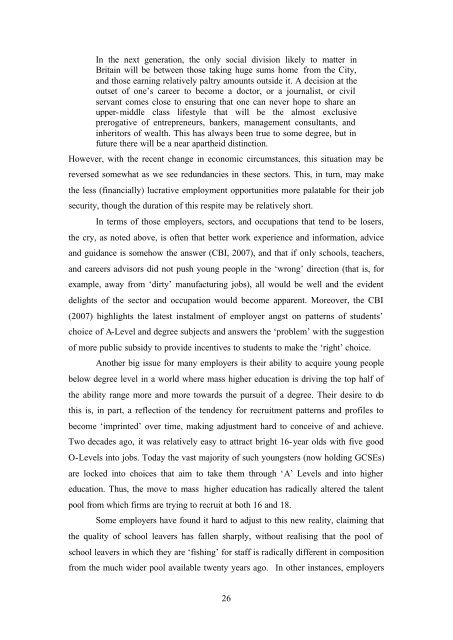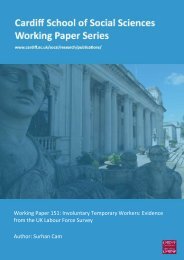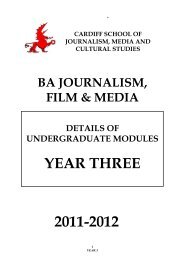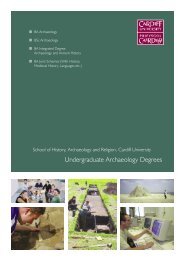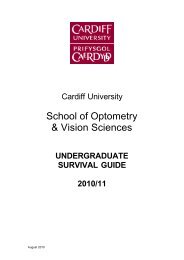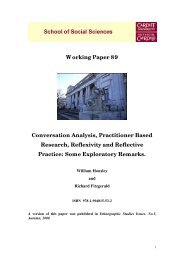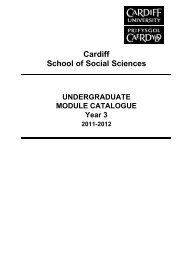Recruitment and Selection â the Great Neglected ... - Cardiff University
Recruitment and Selection â the Great Neglected ... - Cardiff University
Recruitment and Selection â the Great Neglected ... - Cardiff University
Create successful ePaper yourself
Turn your PDF publications into a flip-book with our unique Google optimized e-Paper software.
In <strong>the</strong> next generation, <strong>the</strong> only social division likely to matter in<br />
Britain will be between those taking huge sums home from <strong>the</strong> City,<br />
<strong>and</strong> those earning relatively paltry amounts outside it. A decision at <strong>the</strong><br />
outset of one’s career to become a doctor, or a journalist, or civil<br />
servant comes close to ensuring that one can never hope to share an<br />
upper-middle class lifestyle that will be <strong>the</strong> almost exclusive<br />
prerogative of entrepreneurs, bankers, management consultants, <strong>and</strong><br />
inheritors of wealth. This has always been true to some degree, but in<br />
future <strong>the</strong>re will be a near apar<strong>the</strong>id distinction.<br />
However, with <strong>the</strong> recent change in economic circumstances, this situation may be<br />
reversed somewhat as we see redundancies in <strong>the</strong>se sectors. This, in turn, may make<br />
<strong>the</strong> less (financially) lucrative employment opportunities more palatable for <strong>the</strong>ir job<br />
security, though <strong>the</strong> duration of this respite may be relatively short.<br />
In terms of those employers, sectors, <strong>and</strong> occupations that tend to be losers,<br />
<strong>the</strong> cry, as noted above, is often that better work experience <strong>and</strong> information, advice<br />
<strong>and</strong> guidance is somehow <strong>the</strong> answer (CBI, 2007), <strong>and</strong> that if only schools, teachers,<br />
<strong>and</strong> careers advisors did not push young people in <strong>the</strong> ‘wrong’ direction (that is, for<br />
example, away from ‘dirty’ manufacturing jobs), all would be well <strong>and</strong> <strong>the</strong> evident<br />
delights of <strong>the</strong> sector <strong>and</strong> occupation would become apparent. Moreover, <strong>the</strong> CBI<br />
(2007) highlights <strong>the</strong> latest instalment of employer angst on patterns of students’<br />
choice of A-Level <strong>and</strong> degree subjects <strong>and</strong> answers <strong>the</strong> ‘problem’ with <strong>the</strong> suggestion<br />
of more public subsidy to provide incentives to students to make <strong>the</strong> ‘right’ choice.<br />
Ano<strong>the</strong>r big issue for many employers is <strong>the</strong>ir ability to acquire young people<br />
below degree level in a world where mass higher education is driving <strong>the</strong> top half of<br />
<strong>the</strong> ability range more <strong>and</strong> more towards <strong>the</strong> pursuit of a degree. Their desire to do<br />
this is, in part, a reflection of <strong>the</strong> tendency for recruitment patterns <strong>and</strong> profiles to<br />
become ‘imprinted’ over time, making adjustment hard to conceive of <strong>and</strong> achieve.<br />
Two decades ago, it was relatively easy to attract bright 16-year olds with five good<br />
O-Levels into jobs. Today <strong>the</strong> vast majority of such youngsters (now holding GCSEs)<br />
are locked into choices that aim to take <strong>the</strong>m through ‘A’ Levels <strong>and</strong> into higher<br />
education. Thus, <strong>the</strong> move to mass higher education has radically altered <strong>the</strong> talent<br />
pool from which firms are trying to recruit at both 16 <strong>and</strong> 18.<br />
Some employers have found it hard to adjust to this new reality, claiming that<br />
<strong>the</strong> quality of school leavers has fallen sharply, without realising that <strong>the</strong> pool of<br />
school leavers in which <strong>the</strong>y are ‘fishing’ for staff is radically different in composition<br />
from <strong>the</strong> much wider pool available twenty years ago. In o<strong>the</strong>r instances, employers<br />
26


